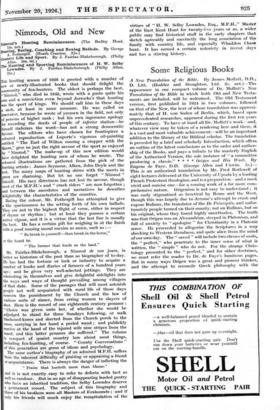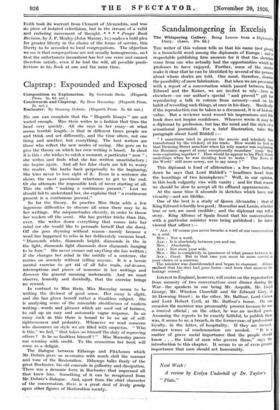Some Religious Books
A- New Translation of the Bible. By James Moffatt, D.D.; D. Litt. (Hodder and Stoughton, Ltd. Es. net.)—The appearance in one compact volume of Dr. Moffatt's New Translation of the Bible in which both Old and New Testa- ments are included, will be welcomed. The Old Testament version, first published in ]924 in two volumes, followed on that of the New, the text of whose translation was approxi- mately that of H. von Soden of Berlin, which, based upon unprecedented researches, appeared during the first ten years of this century. To have at hand all Dr. Moffatt's work—and, whatever view may be taken of a rendering here and there, it is a vast and most valuable achievement—will be an important addition to the library of the Biblical scholar. The translation is preceded by a brief and scholarly Introduction, which offers an outline of the latest conclusions as to the order and author- ship of the Books, and pays a tribute to the masterly English • of the Authorized Version, the sole instance of " a. committee producing a classic." * * * * Origen and His Work. By Eugene de Faye. D.D. (George Allen and Unwin. 5s.)— This is an authorized translation by Mr. Fred Bothwell of eight lectures delivered at the University of Upsala bra leading French Protestant theologian, and is a preparation—and a most vivid and concise one—for a coming work of a far more com- prehensive nature. Origenism is not easy to understand ; it was early stigmatized as heretical by Rome and the West, though this was largely due to Jerome's attempt to crush and expose Rufinus, the translator of the Dc Principiis, and unfor- tunately people turned on their enmity, not on Rufinus, but on his original, whom they found highly unorthodox. The truth was that Origen was an Alexandrian, steeped in Platonism, and full of anxiety to " apologize " for Christianity in a Platonic sense. He proceeded to allegorize the Scriptures in a way shocking to Western literalness, and quite alien front the mind of our own day. The " saved " will include two classes of souls, the " perfect," who penetrate to the inner sense of what is written, the " simple " who do not. For the strange Chris- tology presented_ to the " perfect," and for other doctrines, we must refer the reader to Dr. de Faye's luminous pages. But in many ways Origen was a great and pioneer thinker, and the attempt to' reconcile Greek philosophy with the Faith took its warrant from Clement of Alexandria, and was sibpiece of isolated ecleetisism, but in the Stream of 'a valid and enduring movement of thought. * * * * Prayer Book Revision, by J. F. Mozley (John Murray, 1s.) makes a bold plea for greater liberty in the choice of the forms of service, this liberty to be accorded to local congregations. The objection we see is that congregations- are not usually homogeneous, and that the unfortunate incumbent has but one voice and cannot therefore satisfy, even if he had the will, all possible predi- lections in his .flock at one and the same time.































































 Previous page
Previous page